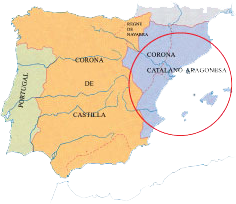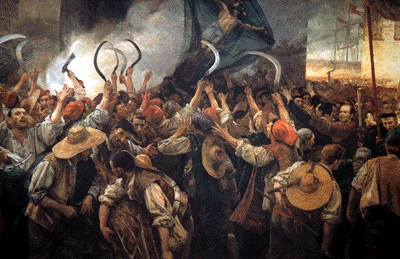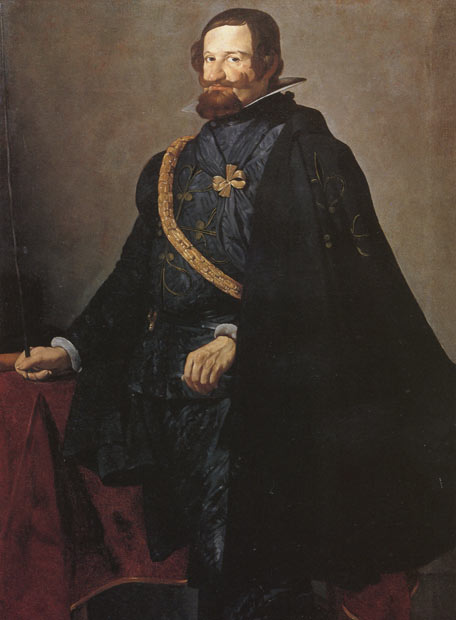
The Catalan Revolt Part I
Kings and Queens got in an out of war, signed peace treaties which they broke just as easily, and the ones who suffered were their subjects, because normally, to finance those wars, monarchies raised taxes. This is almost a universal law, however...it's also an axiom that when people have had far too much, rebellions and uprisings break out.

The results are uncertain until the end. The nobles fear the popular classes and the proletariat will get violent (just look at what happened to the French Monarchy!), while these claim justice and get angry because all their rulers do is send military forces to repress them.
The Catalan revolt is a good example. Did the rest of Europe learn from the Spanish experience?
It begins many years before it happens. In fact it begins with King Philip II, who built a huge fleet, known as the Spanish Armada to fight England. As invincible as he thought it was, it turns God after all had other plans, and what was left of the fleet, came home after being humiliatingly defeated.
Philip had used all the Spanish reales from the country's treasury and then some. But that was not all. The 80 Years War was going on simultaneously, which in fact he started, but then went through kings like wildfire. Philip II, Queen Isabella, Philip III and Philip IV, who also had to contend with the 30 Years' War.
However this 80 year old war in the Spanish Netherlands -and with which they gained their independence from Spain- cost the treasury of Castile the equivalent to millions and millions of dollars. It was no surprise, then, that the country was very poor. To make matters worse, trade with the Americas was at a low ebb, plunging to record lows first in 1631, then in 1641. All this would lead to the Catalan revolt.
Pre-stage of the Catalan Revolt

So the main sources of income for the Spanish Crown had hit bottom. . And what was the king’s response? To search for them elsewhere within the kingdom.
Taking advantage of the fact that the Council of Finances, the Castilian courts and many Castilian economist had asked time and time again for a more fair tax collection in the kingdom, since they had had the weight of pretty much supporting the monarchy for so long.
They asked that the other provinces (Such as Aragon, Guipuzcoa, Portugal, Vizcaya and Navarre) to finance their own defence and not depend on Castile, just like the Italian domains and the Low Countries did. Aragon and Valencia sometimes contributed. Portugal and Catalonia contributed for their own defence but refuse to fund the Crown's wars, as what happened out of their borders was not their problem.
The Count-Duke of Olivares, a key figure in the Franco-Spanish War and the Basque Revolt was back. He met the worse possible combination of characteristics: inept, impatient and overambitious. Although his ideas weren't all bad, the execution of them was certainly lacking. In 1621 he wanted to unify the empire more uniformly.
Olivares met the worse possible combination of characteristics He was inept and incompetent, but he was also impatient and ambitious. Although his ideas weren't all bad, the execution of them...you better be the judge. So in 1621 the Count-Duke is of a mind to better unify the empire under more uniformed rules.
This would mean a reduction in the statutory rights of each province. He offered, in exchange to distribute accordingly, spreading the Spanish Crown's benefits (have we already mentioned that the Crown was hardly receiving any at this point?) and the expenses more evenly, until then reserved for Castile.
As we mentioned before, the Count Duke of Olivares was neither patient nor lacking ambition. The plan mentioned above would take a long time, being a more of a long term project. So what did he do? He proposed a different way: the Union of Arms, meaning: an army of 140,000 recruited and maintained by the different provinces, kingdoms and viceroyalties. With this he pretended to get a generalized union through military means. To carry this plan through Olivares needed the different courts' agreement, as the Castilian court could not decide on its own
The Count-Duke of Olivares vs Catalonia

The Count Duke of Olivares expected Catalonia's rejection and intransigence. The Catalan courts (just like any other in Spain at the time) did not represent the majority of the Principality, nor were they democratic. They did play an important role when it came to writing laws, but their main power was that of negotiating and making subsidy pacts with their sovereign, the Count of Barcelona, the title the old Kings of Aragon held since the 12th Century.
To understand the Catalan revolt it's important to know that the courts of the old regime consisted of representation systems limited to the most powerful families of finest Spanish classes; the nobility, the high clergy and a limited number of cities (urban nobles and patrician knights, in the case of Catalonia ciutats honrats or the high urban bourgeoisie).
These factors contributed to the conflicts in the development of negotiations, as Catalonia was living through the worst political and economic crisis since Ferdinand of Aragon - the worst since the 1630's.
Another factor was that due to the banditry in the roads, promoted by noble factions, the viceroys even prohibited the possession of certain weapons. This raised the susceptibilities of the Catalan institutions, which saw their rights and prerogatives as an autonomous community at risk and contributed to the myth of "Castilian conspiracy". The attempt to collect the quinto (fifth) of the municipal income for the crown, which had been suspended since 1599, was resumed in 1611.
From 1626 the king summoned different courts. Negotiation with the Catalan courts was long and hard and in the end for naught. The Count Duke of Olivares published the Union of the Arms despite the fact that Catalonia was out of it. Olivares believed that he could reach an agreement giving certain advantages to the Catalan oligarchy, but the courts were too slow to consider his proposals.
Olivares was in a hurry so on May 4, the king and his retinue left for Barcelona when they realized the negotiations were getting them nowhere.
However the relations between the Crown and the Catalans did not improve, au contraire. The re-entry of France in the 30 Years' War in 1635 caught Spain by surprise. It meant a greater need of troops and money to maintain them, something which the Catalan government was still opposed to.
In 1639 the Count-Duke of Olivares deliberately chose Catalonia as a front to attack France and in this way get the Principality to contribute in the military efforts. Then an army of 9,000 spent the winter in the Catalan front. The Catalan laws included accommodation for troops which was insufficient to maintain them. The troops broke these laws and there were a lot of excesses towards the population. The Viceroy Dalmau de Queralt, count of Santa Coloma, was unable to prevent them. The patience of the peasants which hosted the troops was also coming to an end, which finally lead to the Catalan revolt in May, 1640.
If you want to continue reading about the Catalan Revolt, go to Part II.
